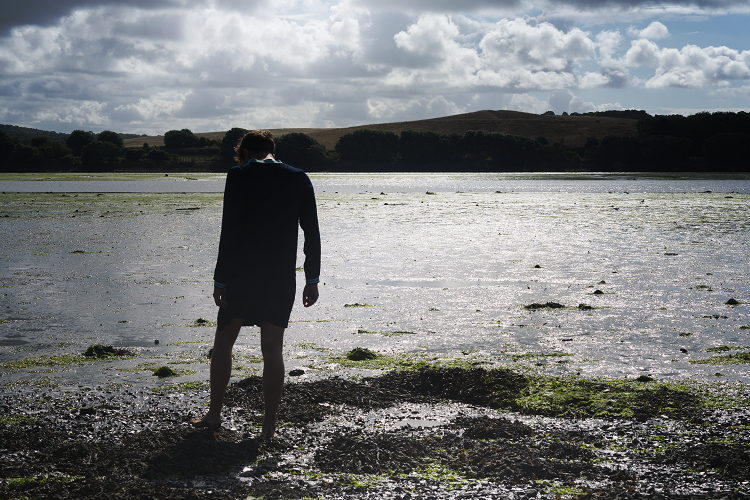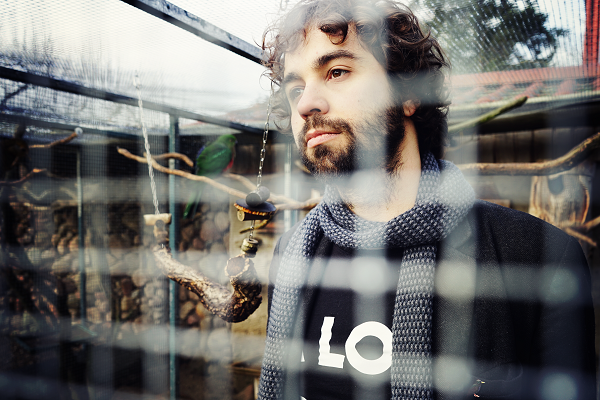
What inspired you to first start making music? And how did you come to be in your current incarnation? Or if you prefer, a brief bio about you.
I was a songwriter before I was a musician. I can still remember the first song I wrote, at five years’ old; it was a protest song, about extinction.
I began playing instruments in my teenage years, during a period of chronic illness when I was in almost constant pain and had very little energy. I would spend a long time in front of the piano or learning songs on the guitar. My sister taught me some chords to get me started, and I went on from there. I have a song about her, My Sister the Swimmer, thanking her for those chords.
I grew up in Oxford where I was in an indie band called Where I’m Calling From, alternating summer-y pop and washes of distorted guitar noise. I moved to London, having formed a lo-fi collective called The Sleeping Passengers with a load of my favourite songwriter-friends. Then to Bristol, where I played guitar for my friend’s band Hands of the Heron and wrote a song or two for them. All the while I was composing for theatre and film to eke out a living, but endlessly writing my own songs between, recording them on my laptop using a variety of instruments and electronics. I moved to Berlin in 2016, and finally started to work as a solo artist – releasing songs and poems and pieces under my own name, Ben Osborn.
Provide us with some info about your latest release…
My debut album Letters from the Border is out now on Nonostar Records. It’s a solo album but also a very important collaboration. The producer Alex Stolze was a big influence on the tracks, playing violin and singing and adding some of the synth and drum machine elements and helping me to shape the sound. Other friends also helped out – Rowan Coupland played harp, Rachel Margetts (of Yr Lovely Dead Moon) played clarinet and Bethany Roberts (of Hands of the Heron) added vocal harmonies; also one of my very favourite songwriters and producers Michael Bleach added layers of found sound as well as backing vocals and percussion.
The album came together at the Nonostar studio, on the German-Polish border. A wild, rural location. I wrote most of the songs and pieces there, and I tried to use my surroundings as an inspiration. Being on the border, I thought a lot about border-crossings – about the birds that are free to fly back and forth over the border, while for humans it can be a deadly thing, a dangerous thing. Some of the songs are of love, or of grief; others are political or historical. There is a sort of spiritual side to the album too, thought I’m hesitant to use the word spiritual.
Which ones would you consider your main influences both music-wise & non-music-wise?
The album was very influenced by the music I was listening to while running each morning before going into the studio. I took my phone and some cheap headphones, and every few days I would change around which albums I had saved on my phone, choosing specific things I knew would inspire me: Björk, Thom Yorke, the Silver Jews, Frank Ocean, Morton Feldman, serpentwithfeet… And all of them had quite specific impacts on the album.
In terms of non-musical influences: while I was writing the album, I was reading several different translations of the psalms, also Howard Schwartz’s book of Jewish mythology, The Tree of Souls. And collections of poems by Anne Carson and William Carlos Williams, as well as an anthology of Borges stories in Spanish with a few tricky words translated into German… I would go into libraries just to do reading research before working on the songs, collecting lines that I thought could be helpful. The Staatsbibliothek in Berlin was a particularly good spot for this.
In what way does your sound differ from the rest genre-related artists/bands and why should we listen to your music? In other words, how would you describe your sound?
I call my style poetic chamber-pop. What I mean by that is: the instrumentation is quite classical (led by piano and violin), the intention is poppy (repetitive, with electronic beats and synth basslines) but the content and the voice are poetic – the lyrics are central to all of the arrangements, and the way I use vocals is sometimes closer to speaking than singing.
The songs tend to end up on indie music playlists, a few tracks down from Sufjan Stevens or Radiohead – but the sound is actually very different to anything else on those playlists. So I think this genre is something somewhat special.
Please name your 3 desert islands albums, movies & books…
Albums: Talk Talk, Spirit of Eden; Morton Feldman’s piano and string quartet; Pavement’s Terror Twilight.
Movies: Short Cuts (Robert Altman), The Innocents (Jack Clayton), The Doom Generation (Greg Araki).
Books: The Heart is a Lonely Hunter (Carson McCullers), The Way Through Doors (Jesse Ball), The Street of Crocodiles (Bruno Schulz).

Do you prefer studio or performing live and why?
Both are full of surprises, and both can be very scary. I’m starting to enjoy performing live more – I like to be able to look people in the eye.
Is there any funny-unique story you would like to share with us, always in relation to your music ‘career’?
Once I had a job playing Madonna songs on a grand piano as part of a theatre piece. On the opening night, Ronnie Wood from the Rolling Stones was in the audience. He came into my dressing room before the show, gave me a vanilla-scented candle and shook my hand, saying “have a good turn, mate.” Then the photographers all appeared and asked me to leave so they could take photos of Ronnie and Kate Moss in my dressing room. It was quite surreal. Not least because then I had to go and bash out a load of Madonna songs on a grand piano, knowing a member of one of the most influential bands of all time was in the audience, and knowing that he had left me a vanilla-scented candle as a gift.
Which track of your own would you point out as the most unique and why?
A lot of effort went into each one, helping each find its own voice, so I believe they are all unique. But there’s one hidden toward the end of the album, it’s called “the only thing”, which I hope people notice. This has quite an experimental arrangement – layers of mandolin, drum machine, synth and vocals that were pitch-shifted by playing them at varying speeds on an old tape machine. It’s a lovely bittersweet folk-pop number, but the arrangement is very unique to my collaborators and myself.
Would you like to share with our readers your future plans?
Lots of concerts – in the UK, the Netherlands, Germany, Argentina, France… and some exciting collaborations. I’ve been writing lyrics and songs for a few different composers, performers and recording artists – Josephine Stephenson, Lari Lu, Alex Stolze, Hands of the Heron, Barbara Cuesta, Hal Kelly, A Psychic Yes – for pieces and songs that should appear in the coming months. I also have some ongoing collaborations that I hope to bring to fruition; I’m particularly excited about the experimental songs I’ve been making with the poet/producer/visual artist Ignatz Höch. And I co-host a monthly night of innovative, eccentric music in Berlin – Stille Kammer at Donau115 – which has some really cool acts coming up.
Free question!!! (Ask yourself a question) you wish to answer and haven’t been given the opportunity…
Ok. My question for me is: what do I wish I could write about?
The fact is, I rarely know what I’m going to write about before I start writing. The words come first, and then they start to shape themselves into something, and I go with it for a long time before knowing what it is.
But there are subjects that I’d like to be able to write about, and to write about well. I think we, as writers and musicians, are going to need to learn how to be political in our music as well as in our daily lives – because there are issues that the world is facing that are just so urgent that they need to become part of daily conversations. Huge issues such as climate change, or the rise of fascism and organized racism, or the crisis of democracy that seems to be taking place in so many parts of the world at once – these are part of the emotional reality of our time, and as such we are going to have to find ways to write about them. If we fail to do so, we aren’t just failing to be relevant and politically active – we’re failing to attempt emotional honesty. And if we’re not doing that, we really have no reason to exist at all and we might as well let the robots take over.
Photo credits: Andrea Huyoff (1st one)
Curated by: Christos Doukakis
Recommended listening:
Connect with Ben Osborn:
